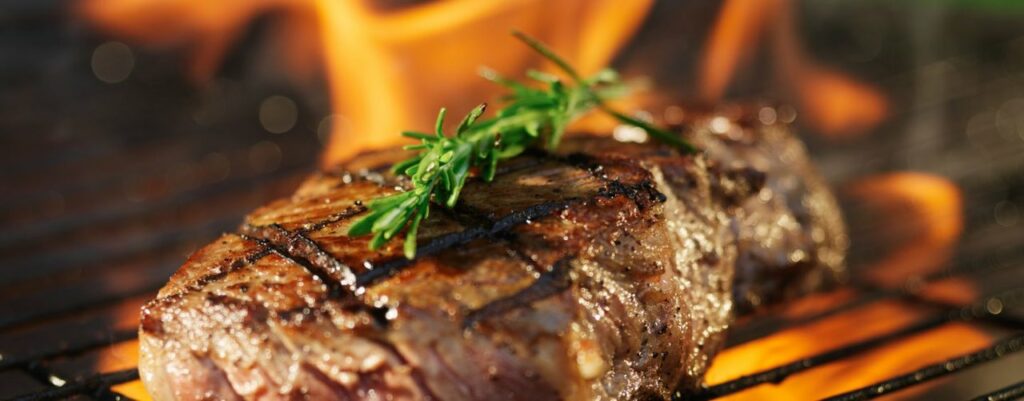Can you enjoy a delicious barbecue and be sustainable?
There are lots of bank holidays in June. Do you already have plans for the extended weekend? The warm summer weather in June is perfect for a BBQ with family and friends. If you don’t have a garden, grill on your balcony or in a local park, or visit a barbecue party at a friends’ home! There are various possibilities, also for food. You can put steaks or sausages on your barbecue grill and/or meatless alternatives like corn, mushrooms, peppers- pick whatever you like. In addition to the food on the grill, salads and bread do a great job as side dishes. You can prepare it before the barbecue begins, so the host has more time for taking care of the guests.
Gather together, bring some cool drinks and put the food on the barbecue grill while you relax and wait for the food to get ready. With the right people, you can grill for hours. Eating food, having meaningful conversations and relaxing together.
In times of greater environmental awareness, many people ask themselves how they can have a sustainable BBQ. One of Yokogawa’s sustainability goals is to stop climate change/ net-zero emissions. How can we contribute to a better world and be social? To not grill at all is not an option. Yokogawians love to be social and enjoy good food. They are not the only ones. As an example, 95,8 % of all Germans like to grill in the summer (Source: Statista).
Let’s check how we can grill in an eco-friendly way.
Equipment: Which grill is the most energy-efficient?
The grills with the lowest energy consumption are gas grills and electric grills. So if you are considering buying a new grill, we would probably recommend you to buy a gas grill with a gas cylinder, so you can put your grill anywhere in the garden being independent of electricity. According to the experts from Shell PrivatEnergie, using a gas grill is even cheaper than using an electric grill.
There are loads of videos online to get information on which gas grill to choose, like the one below.
[ot-video][/ot-video]
If you are a DIY-enthusiast, you could also build the Solar Thermal Panini Maker as described in the video below.
[ot-video][/ot-video]
This might not be the most practical grill for everyone, but it’s definitely a real energy-saving option. Why not using the energy of the sun?
Charcoal grill
If you do not want to replace your charcoal grill, pay attention to the choice of briquettes. Do not use lignite briquettes or briquettes made of tropical wood. When you buy charcoal briquettes, look at the indications on the package. If you are based in Europe, buy briquettes from native wood like pine trees. Look also for FSC or PEFC logos to assure sustainable forest management.
Less climate-damaging emissions when choosing barbecue food deliberately
Even more important than the type of grilling is the food that you buy for the barbecue. According to a life cycle analysis by TÜV Rheinland, you can avoid almost 20 percent of climate-damaging permissions if you do not buy beef or grill cheese. Instead, you should use vegetables, sausages or pork. Animal products are over the whole ‘product journey’ less good for the environment than vegetables.
A barbecue evening with 8 people emits 17,5 to 18 CO2 equivalents (CO2e) which are as many CO2 emissions as a 120 km drive with a middle-class car. On top of the ‘Climate Sinner’-list? Beef with CO2 emissions of 2,9 kg CO2 equivalents per 200 g grilled meat and grilled cheese (1,9 kg CO2e per 200 g). The winner of this challenge? Corn with only 50 g CO2e.
If you want to choose the climate-friendly option, go for vegetables. If it has to be meat, choose pork or sausages.
Quality instead of Quantity
Please don’t buy XXL meat packs from discounters. Better go for less meat but from high quality. Buy from your local organic butcher where animals are grass-fed and live under worth-living conditions. Does it have to be the steak from Argentinian beef? Support your local farmer. Organic food- no matter if meat or vegetables- is usually more expensive than conventional food, but the conditions for both animals and plants are much better. No pesticides, herbicides or antibiotics which are not healthy for the human body are in organic food.
Simple things matter
Think also about simple things. How do you get to the barbecue? Not everyone has to drive by car. Can you take your bike or build a carpool?
When you buy food, take some fabric bags with you, so you don’t have to buy single-use plastic bags. Buy food without much packaging or go to the local farmers market.
Avoid using disposable plates and cutlery. Go for real plates and cutlery which also looks nicer than plastics.
Do you have further suggestions for an eco-friendly barbecue? Feel free to comment!
We wish you nice bank holidays and a wonderful barbecue season!




